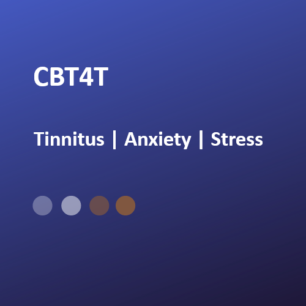NON-COMPLEX TINNITUS
To qualify what I mean more precisely by ‘non-complex tinnitus’, there are many people who have distressing but ‘non-complex’ tinnitus. Tinnitus is the sole significant presenting issue, with no “co-morbidities”. Most commonly, non-complex tinnitus is idiopathic in nature – in other words, the cause is unknown and complications in terms of pathology have been medically ruled out. Those with non-complex tinnitus tend to have TFI (Tinnitus Functional Index) scores under 120
COMPLEX TINNITUS
Those with complex tinnitus most commonly have TFI (Tinnitus Functional Index) score over 120. Complex Tinnitus might include any of the following in addition to tinnitus distress. The list is by no means complete:
- Hyperacusis
- Vestibular disorder (balance)
- Hearing loss
- Non-ideopathic tinnitus (when a cause is identifiable, common examples being Acoustic Shock Injury, pulsatile tinnitus)
- Tonic Tensor Tympani Syndrome (TTTS)
- Pre-existing (pre-tinnitus onset) anxiety and/or depression
- Difficult life situations (home, family, work, social related)
- Additional health issues
Treatment Process
- Learn about and address the neurophysiology of tinnitus and methods of altering the neurobiology to begin impacting the physiological drives that perpetuate distress. In many cases, dependent upon tinnitus origin, this simultaneously reduces tinnitus loudness perception
- The process continues by using specific aspects of the cognitive behavioural therapy to challenge the underlying meaning that the person’s experience of ‘tinnitus’ has to him/her, enabling his/her perceptions to change
- Even those whose tinnitus does not vary in loudness i.e. where loudness does not vary, for example when due to whiplash, the meaning that tinnitus used to have alters and they are able to ignore it
The Cognitive Behavioural Therapy for Tinnitus E-Programme
How to get started with the CBT for Tinnitus E-Programme and choice of course
Tinnitus E-Programme Mission Statement, Aims & Objectives are here: www.tinnituseprogram.org/mission-statement.html
